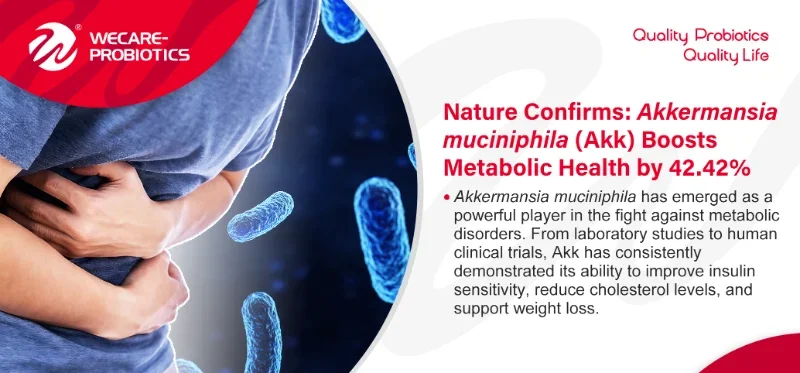Industry Insights
Home > News > Industry Insight > Nature Confirms: Akkermansia Muciniphila (Akk) Boosts Metabolic Health by 42.42%
Nature Confirms: Akkermansia Muciniphila (Akk) Boosts Metabolic Health by 42.42%

Recent groundbreaking research published in Nature Microbiology has highlighted the significant role of Akkermansia muciniphila (Akk) in combating metabolic disorders. This revelation comes at a crucial time when metabolic diseases such as type 2 diabetes, non-alcoholic fatty liver disease, and metabolic syndrome are rising globally. These conditions are characterized by insulin resistance, impaired glucose tolerance, abdominal obesity, decreased levels of high-density lipoprotein (HDL) cholesterol, increased triglycerides, and hypertension. With the prevalence of these diseases climbing alongside obesity rates, Akk stands out as a promising ally in the fight against metabolic dysfunction.
Understanding Metabolic Syndrome
Metabolic syndrome is a cluster of conditions that increase the risk of heart disease, stroke, and diabetes. It is closely linked to obesity and involves a combination of the following:
Insulin Resistance: The body's inability to respond to insulin effectively.
Impaired Glucose Tolerance: Higher than normal blood sugar levels.
Abdominal Obesity: Excess fat around the stomach and abdomen.
Low HDL Cholesterol Levels: Often referred to as "good" cholesterol.
High Triglyceride Levels: Increased fat levels in the blood.
Hypertension: Elevated blood pressure.
The Role of Gut Microbiota
The gut microbiota is a complex ecosystem that plays a crucial role in maintaining health by producing metabolites that act as signaling molecules. These metabolites can influence the synthesis and release of various hormones, such as cholecystokinin, glucagon-like peptide-1 (GLP-1), serotonin, and ghrelin, thereby affecting insulin sensitivity, fat storage, and appetite control.
Akkermansia Muciniphila: The Probiotic Champion
Among the diverse microbial communities in the gut, Akkermansia muciniphila has demonstrated a strong capacity to counteract metabolic disorders. Researchers at Duke University have identified two essential gene clusters, MUL1 and MUL2, which are critical for Akkermansia's growth in mucin, a component of mucus. Their study, published in June 2023, showed that when Akk can effectively utilize mucin, it lowers the expression levels of genes related to cholesterol synthesis in mouse intestinal cells.
Human Clinical Trials
A landmark clinical trial led by the research team from the University of Leuven in Belgium, published in Nature Medicine, tested the effects of Akk on 32 overweight and obese individuals with insulin resistance. Over 12 weeks, participants were administered Akk supplements, leading to remarkable improvements:
Improved Insulin Sensitivity: Participants experienced a 42.42% increase in insulin sensitivity. Enhanced insulin sensitivity can lead to better glucose regulation and reduced fat storage.
Weight and Fat Reduction: On average, participants lost approximately 2.27 kg of body weight and about 1.37 kg of fat mass.
Lipid Profile Improvements: Compared to the placebo group, the group receiving both live and pasteurized Akk showed an 8.68% reduction in total cholesterol, a 7.53% decrease in low-density lipoprotein (LDL) cholesterol, and a 15.71% reduction in triglycerides.
Safety and Tolerance
The study demonstrated that both live and pasteurized forms of Akk were effective, with no adverse effects on gut microbiota stability. Participants exhibited good tolerance and safety profiles throughout the trial, highlighting Akk's potential as a safe therapeutic option for metabolic disorders.
Implications for the Future
The promising results from Akkermansia muciniphila research pave the way for developing next-generation probiotics targeting metabolic health. By modulating insulin sensitivity, reducing cholesterol levels, and supporting weight management, Akk presents a viable strategy for improving metabolic health and reducing the burden of related diseases.
Conclusion
Akkermansia muciniphila has emerged as a powerful player in the fight against metabolic disorders. From laboratory studies to human clinical trials, Akk has consistently demonstrated its ability to improve insulin sensitivity, reduce cholesterol levels, and support weight loss. As the prevalence of metabolic diseases continues to rise, incorporating Akk into therapeutic strategies holds immense promise for improving global health outcomes.
Wecare Probiotics is a pioneering national high-tech enterprise dedicated to the research and development, production, and application of probiotic strains. We continue to focus on emerging trends in probiotics to offer innovative solutions for health and wellness. Stay tuned with Wecare Probiotics as we explore the next frontier in probiotic science and its applications.
Main references
1.Davey LE, Malkus PN, Villa M, et al. A genetic system for Akkermansia muciniphila reveals a role for mucin foraging in gut colonization and host sterol biosynthesis gene expression. Nat Microbiol. 2023;8(8):1450-1467. doi:10.1038/s41564-023-01407-w
2. Rao Y, Kuang Z, Li C, et al. Gut Akkermansia muciniphila ameliorates metabolic dysfunction-associated fatty liver disease by regulating the metabolism of L-aspartate via gut-liver axis. Gut Microbes. 2021;13(1):1-19. doi:10.1080/19490976.2021.1927633
3.Lauren E. Davey et al. A genetic system for Akkermansia muciniphila reveals a role for mucin foraging in gut colonization and host sterol biosynthesis gene expression. Nature Microbiology, 2023, doi:10.1038/s41564-023-01407-w.
4.Yasutake N et al. The role of tumor necrosis factor (TNF)-alpha in the antitumor effect of intrapleural injection of Lactobacillus casei strain Shirota in mice. 1999
5.Xiao SD et al. Multicenter, randomized, controlled trial of heat-killed Lactobacillus acidophilus LB in patients with chronic diarrhea. 2003.
6.Asahara T et al. Antimicrobial activity of intraurethrally administered probiotic Lactobacillus casei in a murine model of Escherichia coli urinary tract infection. 2001.
7.Wagner RD et al. Probiotic effects of feeding heat-killed Lactobacillus acidophilus and Lactobacillus casei to Candida albicans-colonized immunodeficient mice. 2000.









 Leave a Message
Leave a Message Email
Email Linkedin
Linkedin